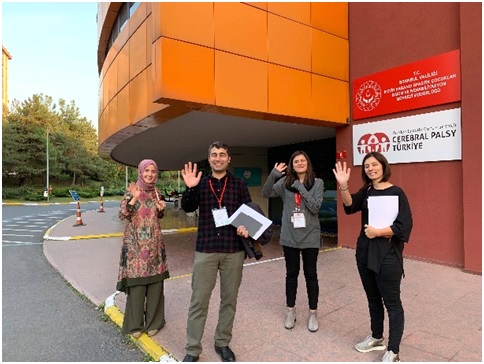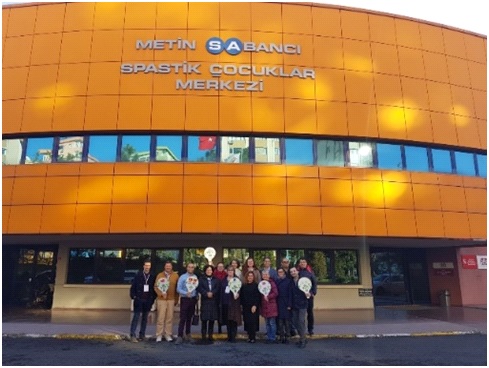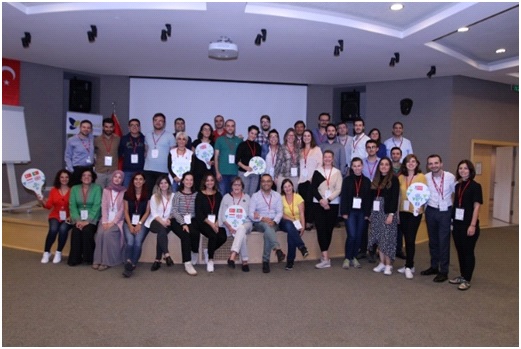Vocational Training for Physiotherapists about Family Centred and Play Based Approaches in Early Childhood Intervention (ECVET Based).
EU 2017-1-TR01-KA202-046189
Duration 24 months. from 2017 till 2019
Partners:
Spastic Children’s Foundation of Turkey (Turkiye Spastik Cocuklar Vakfi)
University of Minho-Portugal
PRAXIS EUROPE CIC- United Kingdom
GAZI UNIVERSITESI-Turkey,Ankara
ENGELLI YASLI HIZMETLERI GENEL MUDURLUGU, Turkey, Eskişehir
Associação de Paralisia Cerebral de Braga, Portugal
In this project, the target group is physiotherapists working in the clinic with infants and children. It is necessary to know the physiotherapists closely to understand the logic of the project.
Physiotherapists are highly qualified health professionals who help people affected by injury, illness or disability through movement and exercise, manual therapy, education and advice. Physiotherapy “provides services to individuals and populations to develop, maintain and restore maximum movement and functional ability throughout the lifespan”.
Physiotherapists graduate with a 4 year undergraduate degree. During the first two years of undergraduate education, there are courses in basic medical sciences such as anatomy, physiology and assessment courses. In the third year, courses on treatment movements are given for diseases in different fields such as orthopaedics, neurology, cardiovascular and children. In the last year of education program, there is clinical internship practice. Physiotherapy practices in children’s diseases are taught as a compulsory course for one or two semesters in the 3rd year of the program. The field that physiotherapists serve is very broad and because they serve so many different diseases, basic training programs for diseases are very basic in undergraduate education. The basic level of physiotherapy given in undergraduate education is called “traditional physiotherapy applications”. Traditional physiotherapy practices do not take into account the development of the baby and the child, the characteristics of the baby with developmental risk and the characteristics of the mother and parents. There is no part of the world that is training an early intervention specialist in undergraduate education. For this reason, early intervention practices are provided by a multidisciplinary approaches by physiotherapist, child development specialist and psychologist.
In the state of Texas in the United States, physiotherapists who are willing to work on early childhood intervention field are obliged to take additional courses from the child development and psychology departments to solve this problem. World Confederation for Physical Therapy (WCPT) recommends that the undergraduate curriculum should be at least 70% identical in different countries. For this reason, physiotherapists’ post-graduate training needs are valid in all countries. The WCPT has stated that physiotherapists should develop themselves with the Master and Doctorate programs related to the field in which they work. However, this recommendation is not a recommendation that all physiotherapists working in the clinic can perform.
Our project aim is to strengthen the competences of physiotherapists about new approaches in early intervention system.
To ensure this can be achieved, VET for EI will generate:
-a dedicated curriculum and relevant training material for the physiotherapists about play-based and family centred approaches in early childhood intervention (based on ECVET learning outcomes approach)
– an innovative online learning platform, that will allow for an interactive learning experience anytime anywhere (PC, smartphone and tablet), multilingual, and following the Open Source approach (so “free”), provided freely to the related target group.
– the county reports which shows the current system and approaches about early childhood intervention system in partner countries
– the comparative report which the early childhood intervention systems of the partner countries will be compared.



Intelectual Outputs:
O1 Country Status Report
O2 Play Based and Family Centered Early Intervention Approach Curriculum andTraining Course Content
Questions :
Curriculum:
O4 Comperative Report:
